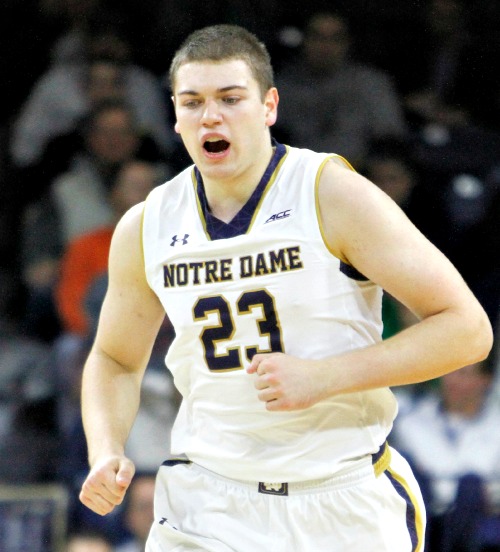Fast Forward: Notre Dame Basketball Player Adjusts to Quickness of College Game
Lithuanian-born Martinas Geben offers insights into the recently concluded season and the importance of Catholicism.

Prior to Wisconsin’s 71-64 semifinal upset of Kentucky in the NCAA men’s basketball tournament, no team had been able to defeat the Wildcats this season. Even though Notre Damecame close in their Elite Eight matchup, the Fighting Irish lost, 68-66, to the Wildcats, putting an end to their NCAA title hopes.
Despite the disappointing defeat, the Fighting Irish’s Martinas Geben likes to remember the many positives of the 2014-2015 season and is looking ahead to the next. The 6-foot-9-inch freshman forward hopes to build on his team’s 32-6 record, the best so far in head coach Mike Brey’s 15-year tenure at Notre Dame.
Geben, who moved from Vilnius, Lithuania, to Hagerstown, Md., in 2011, finds Notre Dame to be an ideal fit for him. The reasons for this are not only athletic, but academic and spiritual. Geben has enrolled in the Mendoza College of Business, and, most importantly, since his arrival in the U.S., he has started to take his Catholic faith more seriously.
Geben, who has played on the Under-19 Lithuanian national team, spoke with Register correspondent Trent Beattie as Duke won its fifth NCAA basketball title by defeating Wisconsin 68-63.
You played Duke three times this season and won twice. What do you think of Duke’s championship run, in which you were able to hand them half of their four losses?
We had a lot of experience playing Duke this year. We beat them, 77-73, at home, but lost our next game in Durham, N.C., by 30 points. Then we got our revenge in the ACC [Atlantic Coast Conference] Tournament in Greensboro, N.C., with a 74-64 win.
Duke played very well to reach the national championship game, and so did Wisconsin. Both teams are very good. They both have unique, talented players led by two great coaches. There are so many things to take into consideration about who might come out on top, but in the last analysis, I think the players and their effort decide the outcome of the game.
You barely missed the Final Four because of a two-point loss to top-ranked Kentucky. Are you disappointed about that?
We were going back and forth, toe-to-toe, but in the end, they were able to come out on top. They not only have a lot of talent, but they use discipline and teamwork to make the best of the talent. They’ve been doing that all season, which is why they only lost once. We give credit to them for coming back and winning.
Even though we would have liked to be competing for a national championship, it was a great season for us, especially when you consider the previous season’s 15-17 record. We won the ACC Tournament, went fairly deep into the NCAA tournament and finished with a 32-6 record. God willing, we can take all that and build on it, come back next year and do even better.
What has been the most challenging thing about college basketball for you so far?
Going from high school to college, the toughest thing is adjusting to the increased speed, intensity and physicality of the game. In college, it’s faster, more serious and more aggressive, which takes time to get used to.
In high school, a lot of the guys you compete against are just out there for recreation, so they don’t put a lot of effort into the game. This makes the level of play lower than that found in college. Most guys in college were the best players on their high-school teams, so you can’t count on big point and rebound totals or easy wins.
Why did you choose to go to Notre Dame?
Notre Dame has the perfect combination of athletics, academics and faith. Lots of other schools have one or two of those things, but not all three, so that’s why I’m here. I love playing on the basketball team, I’m challenged by the classes, and I’m very much at home with the Catholicism that permeates the campus. It’s the ideal place to be at this time in life.
What do you like most about the Catholic Church?
There are so many things to choose from, like the fact that Jesus started the Catholic Church and that the Church serves people in need all over the world, sees the inherent dignity of everyone and has been a part of so many advances in science and art.
Maybe the most important thing is the Church’s clear guidelines. For those who don’t like the guidelines, two things should be considered. The first thing is that most of the guidelines are really quite easy to follow. The second thing, which is even more important, is that they are for our own good.
In secular society, there are laws aimed at helping people avoid behaviors that deserve punishment in prison. In Catholicism, it’s very similar: God has given us 10 relatively simple laws to live by so we can avoid behaviors deserving of punishment in the afterlife’s permanent prison, or hell. In fact, many secular laws correspond exactly with Church laws, so it’s easy to see how someone could end up in both prisons.
More important than avoiding bad behaviors, though, is the practice of virtuous ones, which lead us to everlasting happiness. Our good and loving Father in heaven wants us to know the truth about what he desires from us so that we will be free to live happily here and hereafter.
In order to find this happiness, we should listen to our Father, who has revealed his laws in the Ten Commandments and then perfected his revelation through his Son. Jesus showed us in his life, and continues to show us through his Church today, how to live in order to be pleasing to our Father and to be genuinely happy.
Did you find it easy to be happy in the United States after moving here from Lithuania?
Moving to the States was a change that took about three months for me to get used to. Americans tend to be friendlier and more generous — just more community-oriented — and the education system is different, too. The language difference wasn’t that hard, though, because English in Lithuania is like Spanish in the States: It’s not the primary language, but it is very commonly taught in schools.
Most Lithuanians are baptized Catholics, but the practice of Catholicism is another matter, so coming over here was a revelation, as far as taking the Church seriously. When I enrolled as a sophomore in 2011 at St. Maria Goretti High School in Hagerstown, Md., I was able to interact with priests on a regular basis, go to Mass, have access to a chapel all day and just see how Catholicism is a real-life thing meant to be lived.
In Lithuania, St. Casimir is the most popular saint, but I didn’t think about how I, too, should really be trying to be a faithful Catholic man. I’ve started to see saints differently and have gotten inspiration from St. Joseph, St. Anthony of Padua and St. Maria Goretti.
One of the two major versions of the Divine Mercy image is associated with Vilnius. Did you grow up with a knowledge of that image?
I had a vague knowledge of St. Faustina’s Divine Mercy image, but I didn’t know it was closely associated with my hometown, which was a part of Poland in St. Faustina’s time. That’s a specific example of how I was officially Catholic but didn’t really let it affect my daily life. The story of Divine Mercy was big enough, especially in my area of the world, for me to know about it somewhat, but I just saw it as a matter of history.
Now, it’s a more practical matter. I know Divine Mercy Sunday is celebrated the weekend following Easter and that lots of people go to reconciliation the day before the Sunday Mass, which was made Divine Mercy Sunday by St. John Paul II, who was also from my area of the world.
The Divine Mercy Chaplet is prayed by a lot of people, but I haven’t done that myself yet. I do pray though, and it really helps me to calm down and be thankful for the many gifts God has blessed me with. Through prayer, I reconnect with the spiritual side of life, especially at the end of the day.
When we pray, our weakness is replaced by God’s strength. It’s one thing to know what’s good for us but another thing to want and be able to do what’s good for us. This is why prayer is vital — it makes the desire of virtue and the ability to attain it possible. Prayer, along with the sacraments, is where we get the power to successfully live out God’s plan for us.
Trent Beattie writes from Seattle.














